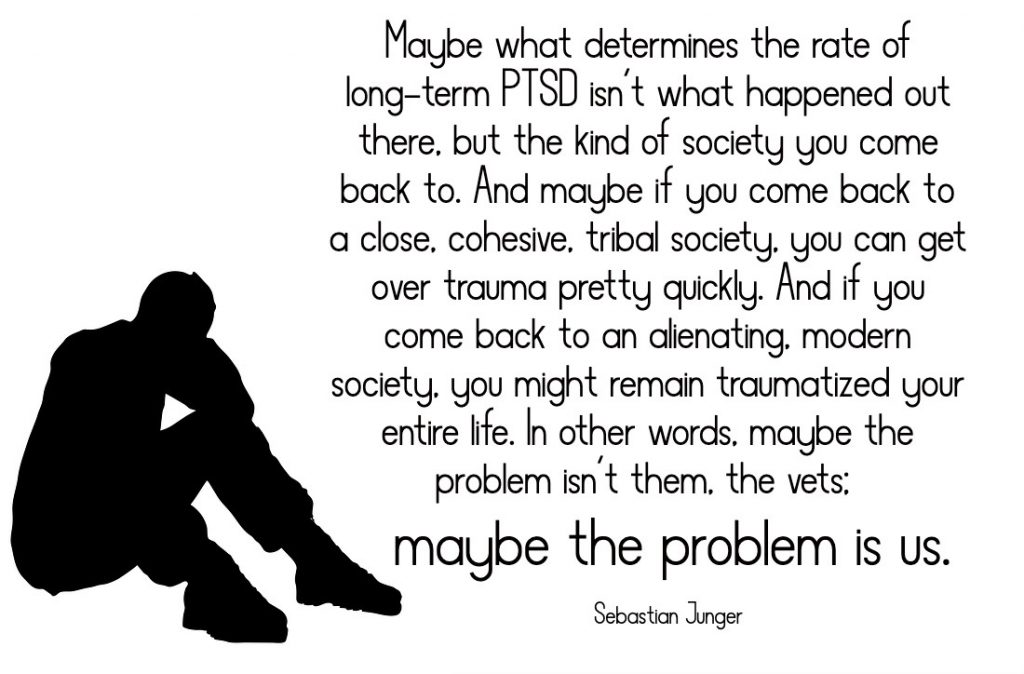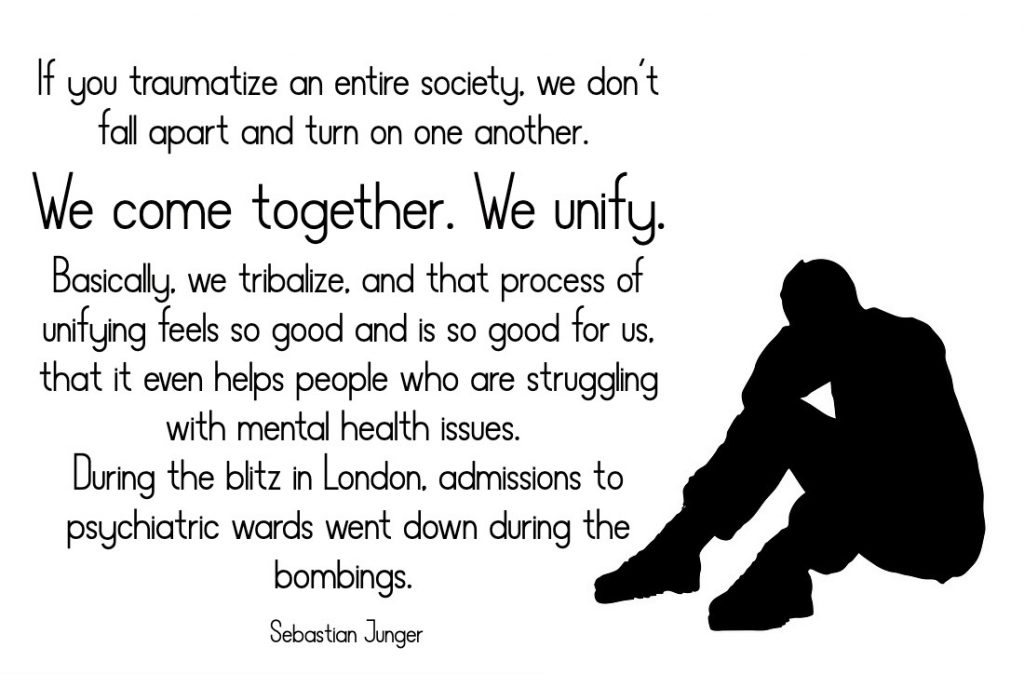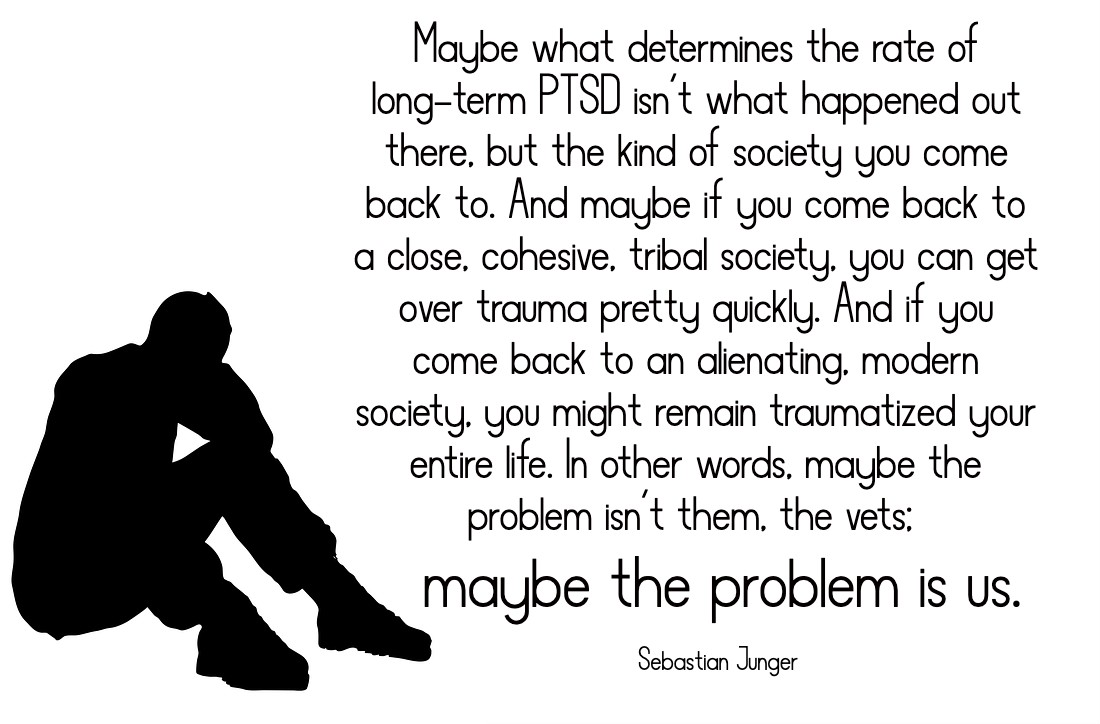I’ve been thinking and reading lately in light of Remembrance Day. Given who I am and what I do, my interest is laced with compassion for those veterans that have served and return home with wounds that cannot be seen but are incredibly real.
These unseen wounds impact their lives every moment of every day–going to the store, out for a walk, talking with a neighbor. It impacts their families–how they parent, how they do (or don’t) connect with their spouse. The unseen wounds endanger their very lives as the desire to escape the life that gives the pain.
I listened to Sebastian Junger’s TED talk about the military. While going to war involves violence and killing and other things we desperately don’t want to happen, being in military service does something important.
Military service involves serving alongside others in close and intimate ways. It is putting yourself on the line for the people around you, and finding ways to work together even if in calmer times, they might be frustrating or annoying. You collaborate with others different than yourself as a means of survival.
Military services requires a willingness to serve the greater good, to do hard and meaningful things to help those around you. It means signing up for a cause you believe in and could cost you everything. Service in the military creates bonds that are far more than pleasant or friendly–the bonds are essential to getting out alive.
It’s a remarkable thing to struggle with invisible wounds from having served–and desperately missing the military.
That’s a real thing. My recollection of talking to a veteran wasn’t that he missed any of the horrible parts of war–but he desperately missed the camaraderie that is forged in the midst of difficult experiences. The deep connection with people who have your back and are willing to demonstrate it in costly ways is something that is so appealing–and so missed on return.

Sebastian Junger is a journalist who has spent time on the front lines of war. He has some profound insight about what makes life so hard for veterans returning from military service to reintegrate with the rest of us.
He doesn’t miss killing people. He’s not crazy. He doesn’t miss getting shot at and seeing his friends get killed. What is it that he misses? We have to answer that. If we’re going to stop war, we have to answer that question.
I think what he missed is brotherhood. He missed, in some ways, the opposite of killing. What he missed was connection to the other men he was with. Now, brotherhood is different from friendship. Friendship happens in society, obviously. The more you like someone, the more you’d be willing to do for them. Brotherhood has nothing to do with how you feel about the other person. It’s a mutual agreement in a group that you will put the welfare of the group, you will put the safety of everyone in the group above your own. In effect, you’re saying, “I love these other people more than I love myself.”
n World War II, there were many stories of soldiers who were wounded, were brought to a rear base hospital, who went AWOL, crawled out of windows, slipped out doors, went AWOL, wounded, to make their way back to the front lines to rejoin their brothers out there. So you think about Brendan, you think about all these soldiers having an experience like that, a bond like that, in a small group, where they loved 20 other people in some ways more than they loved themselves, you think about how good that would feel, imagine it, and they are blessed with that experience for a year, and then they come home, and they are just back in society like the rest of us are, not knowing who they can count on, not knowing who loves them, who they can love, not knowing exactly what anyone they know would do for them if it came down to it. That is terrifying. Compared to that, war, psychologically, in some ways, is easy, compared to that kind of alienation. That’s why they miss it, and that’s what we have to understand and in some ways fix in our society. (emphasis mine)
Sebastian Junger, Why veterans miss war
There are some strong indicators in the research that when circumstances challenge us, we lean into each other. We rely on each other and give each other support that we crave.
Facing adversity together, we receive the connection that we are wired for and require as a necessity of life.
Difficult circumstances draw us together in ways that are good for us.
In times of trouble, we don’t sweat the small stuff. We band together for our very survival in ways that unite us, and have us feel fully alive. We work for our common good because we don’t have choice.
We’ve had tastes of this–like in the spring when the floods threaten us.
After 9/11, the murder rate in New York City went down by 40 percent. The suicide rate went down. The violent crime rate in New York went down after 9/11. Even combat veterans of previous wars who suffered from PTSD said that their symptoms went down after 9/11 happened. The reason is that if you traumatize an entire society, we don’t fall apart and turn on one another. We come together. We unify. Basically, we tribalize, and that process of unifying feels so good and is so good for us, that it even helps people who are struggling with mental health issues. During the blitz in London, admissions to psychiatric wards went down during the bombings.
Sebastian Junger, Our lonely society makes it hard to come home from war

Seems to me that if we seek to reduce PTSD in veterans, we best start by figuring out how to be people that others can count on, that we love fiercely, and we find meaning in serving the greater good even if it costs us.
That might not only benefit veterans, it would save all of us.
And oh, that we would figure out how to unite together around a common enemy that affects us rather than use issues like drug use or drunk driving or political party to divide us. That we wouldn’t quibble with each other but find the common enemy of climate change, or fresh drinking water for all or the residual effects of colonization something that we all rally around.







Write a Comment